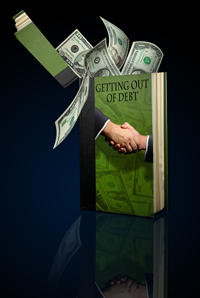Debt and Tax Relief
Bankruptcy is a powerful tax relief and debt relief weapon for consumers and small businesses. Your personal or business bankruptcy may eliminate overwhelming debts and taxes and give you or your business a fresh start.

 Debt Relief from Credit cards, medical bills, loans, lawsuits
Debt Relief from Credit cards, medical bills, loans, lawsuits
and judgments
Bankruptcy may give you maximum debt relief. Bankruptcy eliminates most unsecured debts, such as credit cards, personal loans, medical bills, lawsuits and judgments against you. Once the Bankruptcy Court discharges your debts, most if not all of your creditors can never collect any money from you.
We have found it is all too common that our clients have taken loans or withdrawn money from their savings or retirement accounts to pay off their credit cards and other debts they could eliminate in bankruptcy. Consult a bankruptcy lawyer first.
You may be undermining your financial future by taking a loan or using money that you saved for retirement to pay debts that may be eliminated in bankruptcy. Additionally, the early withdrawal of money from your retirement account may result in interest and penalties charged to you by the state and IRS.
 Mortgages, foreclosures, and selling your property
Mortgages, foreclosures, and selling your property
You can file a Chapter 7, 11, 12, or 13 case, to stop your lender from foreclosing against your home or other real estate. The filing of any bankruptcy case immediately stops the lender from taking any action against your property with few exceptions. The action that you must take to keep your home or other property depends on what steps have already been taken by your lender. You may need to act very quickly to stop a foreclosure, sheriff's sale or attachment of your home or other real estate.
Learn More about mortgages and foreclosures
 Tax relief, liens, levies, and wage garnishments
Tax relief, liens, levies, and wage garnishments
State and federal income taxes can be discharged under some circumstances. To get tax relief, the date that you file your bankruptcy case is critical. Your bankruptcy lawyer must determine precisely the first date when you can file your bankruptcy case, to discharge some or all of your income tax liabilities. We will work closely with you and your accountant or tax advisor, to determine if you can eliminate some or all of your tax debt. Filing bankruptcy immediately stops most levies and wage garnishments.
Learn More about taxes, liens, levies and wage garnishments
 Car, boat, asset and business loans
Car, boat, asset and business loans
If you have a loan that is secured by your car, truck, boat, business or other property you will have to pay the loan to keep the property, although, in some situations, your bankruptcy lawyer may be able to reduce or eliminate the debt entirely.
Another option is to file a Chapter 13,
Chapter 11, or
Chapter 12 bankruptcy case. This allows you to catch up on your overdue payments and keep possession of your vehicle, boat or business assets under a payment plan confirmed by the Bankruptcy Court.
There are other options as well, such as surrendering your property to your lender, filing bankruptcy and discharging the debt.
There is a huge difference in how bankruptcy laws treat student loans as opposed to credit card and other unsecured debts. Most, if not all, credit cards and other unsecured debts can be eliminated by filing bankruptcy. Usually, student loans will not be discharged unless you can prove that you cannot repay the loan because it would cause you or a dependent "undue hardship".
Do not despair. There are real solutions. Various programs exist that help borrowers make affordable payments. Talk to bankruptcy lawyer Don Adler about how you may be able to reduce, or, under the right circumstances, eliminate payments.
Learn More about student loans
 Filing bankruptcy now or later
Filing bankruptcy now or later
Sometimes it makes sense to file bankruptcy right away and sometimes delaying the filing is the best thing for you to do. There are many factors that you need to take into consideration before you decide when to file your case. The key here is to consult with a bankruptcy lawyer now to find out what bankruptcy solutions or other options you may have. Consulting us now will give you a concrete plan - what, when and how - to solve your debt or tax problems and rebuild your financial future.
Learn More about choosing the right time to file for bankruptcy
How will a divorce impact your bankruptcy? How will a bankruptcy impact your divorce? Where there are insufficient resources to pay the marital debts by one or both spouses, bankruptcy may help eliminate the debt. Divorcing spouses with debt or tax problems that are considering bankruptcy must be careful about the financial arrangements and division of property that they agree to in their separation or settlement agreement.
The time when you or your spouse files for divorce or bankruptcy can be crucial and affect the outcome of one or both cases. Based on your needs, priorities and financial condition, you may decide it's best to file a bankruptcy case before or after filing for divorce. This is a critical issue that must be discussed with both your divorce and bankruptcy lawyers to get it right.
Learn More about divorce and bankruptcy

